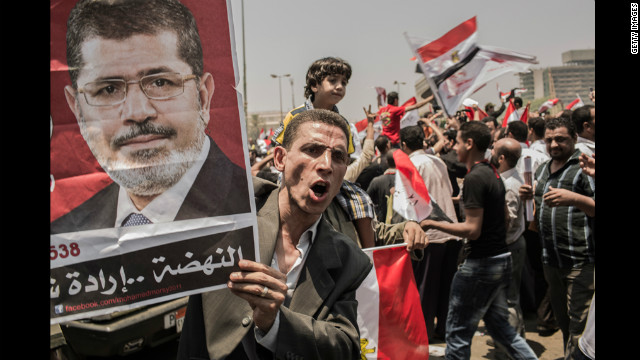 Egyptian supporters of the Muslim Brotherhood's Mohamed Morsi rally in Cairo's Tahrir Square on Monday, June 18. Morsi declared victory as Egypt's first democratically elected president even as military rulers issued a decree that virtually stripped the position of power.
Egyptian supporters of the Muslim Brotherhood's Mohamed Morsi rally in Cairo's Tahrir Square on Monday, June 18. Morsi declared victory as Egypt's first democratically elected president even as military rulers issued a decree that virtually stripped the position of power.
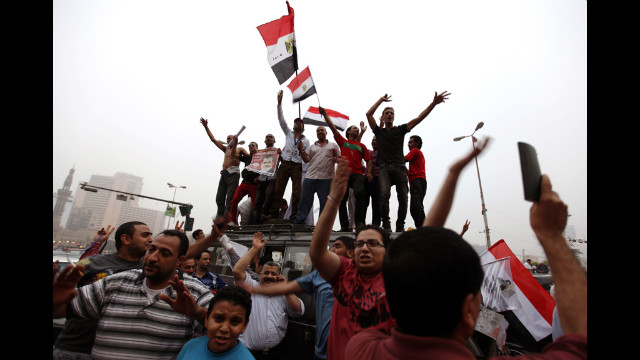 Morsi supporters wave flags Monday in Cairo's Tahrir Square after the Islamists claimed victory. The square was considered the heart of the February 2011 uprising that led to Hosni Mubarak's downfall.
Morsi supporters wave flags Monday in Cairo's Tahrir Square after the Islamists claimed victory. The square was considered the heart of the February 2011 uprising that led to Hosni Mubarak's downfall. 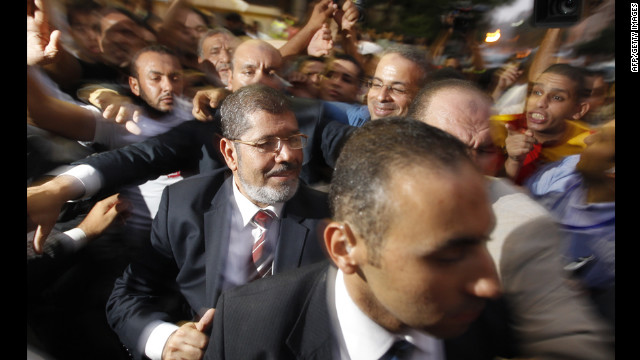 The Muslim Brotherhood's Mohamed Morsi makes his way through supporters at electoral headquarters early Monday in Cairo. In a victory speech, Morsi did not address the military council's move but tried to allay fears he would impose an Islamist state.
The Muslim Brotherhood's Mohamed Morsi makes his way through supporters at electoral headquarters early Monday in Cairo. In a victory speech, Morsi did not address the military council's move but tried to allay fears he would impose an Islamist state. 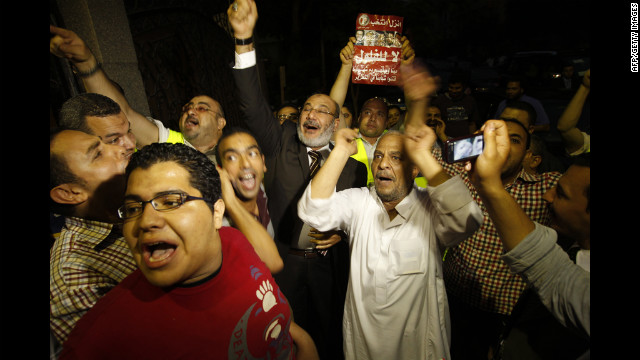 Morsi supporters celebrate Monday in Cairo. Votes in the Egyptian capital, the largest population center, continued to be tallied, but unofficial results by a state-run news website showed Morsi leading elsewhere with 11.2 million votes, compared with 10.3 million for Ahmed Shafik, the last prime minister in the waning days of Mubarak's regime.
Morsi supporters celebrate Monday in Cairo. Votes in the Egyptian capital, the largest population center, continued to be tallied, but unofficial results by a state-run news website showed Morsi leading elsewhere with 11.2 million votes, compared with 10.3 million for Ahmed Shafik, the last prime minister in the waning days of Mubarak's regime. 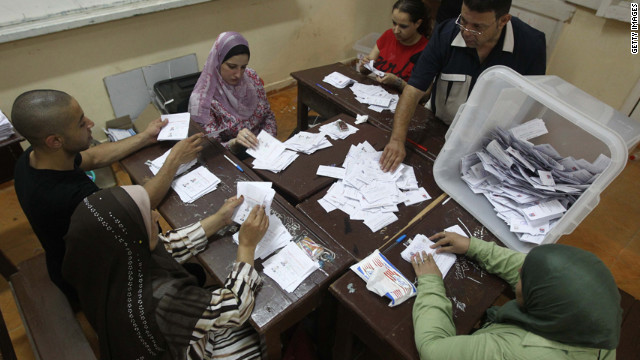 Egyptian election officials count ballots at a polling station in Cairo on Sunday, June 17. The official vote count was scheduled to be finished Monday.
Egyptian election officials count ballots at a polling station in Cairo on Sunday, June 17. The official vote count was scheduled to be finished Monday. 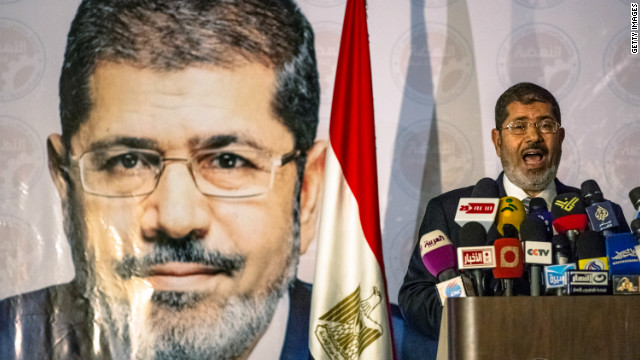 The Muslim Brotherhood on Sunday claims its candidate, Mohamed Morsi, has defeated foe Ahmed Shafik to become Egypt's president.
The Muslim Brotherhood on Sunday claims its candidate, Mohamed Morsi, has defeated foe Ahmed Shafik to become Egypt's president. 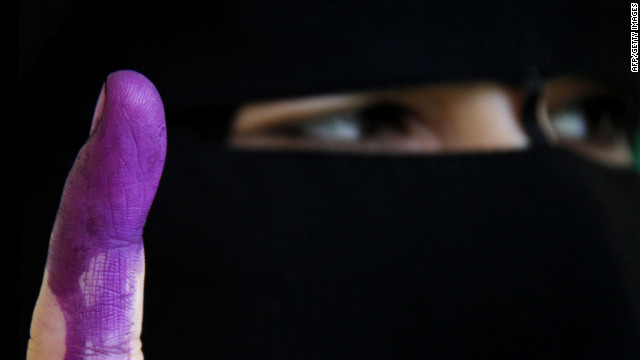 An Egyptian woman shows her ink-stained finger, marking that she voted in Cairo on Sunday.
An Egyptian woman shows her ink-stained finger, marking that she voted in Cairo on Sunday. 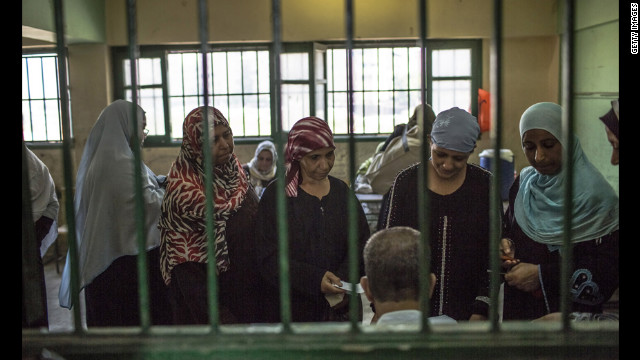 Women line up to vote at a polling station in Cairo, Egypt, on the second and final day of the run-off presidential election.
Women line up to vote at a polling station in Cairo, Egypt, on the second and final day of the run-off presidential election. 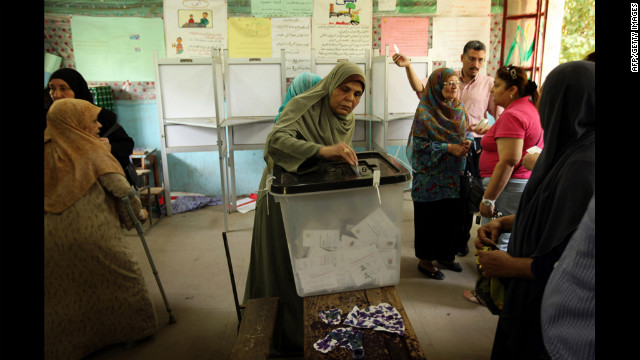 Women line-up to cast their vote at a polling station in Cairo on Sunday.
Women line-up to cast their vote at a polling station in Cairo on Sunday. 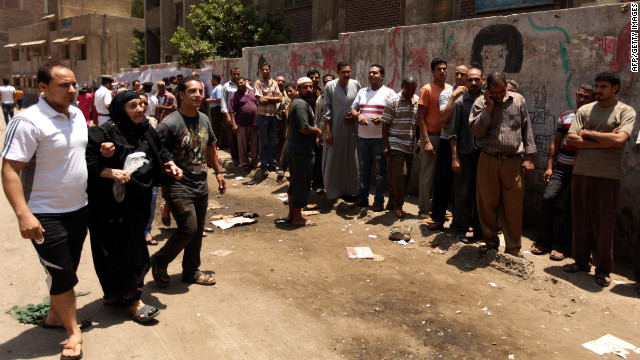 Egyptian Christian Coptic men help a woman reach a polling station in the Cairo Coptic Shubra neighborhood on Saturday, June 16. Voters returned to the polls after Egypt's Supreme Constitutional Court ruled Thursday that the Islamist-led Parliament must be immediately dissolved.
Egyptian Christian Coptic men help a woman reach a polling station in the Cairo Coptic Shubra neighborhood on Saturday, June 16. Voters returned to the polls after Egypt's Supreme Constitutional Court ruled Thursday that the Islamist-led Parliament must be immediately dissolved. 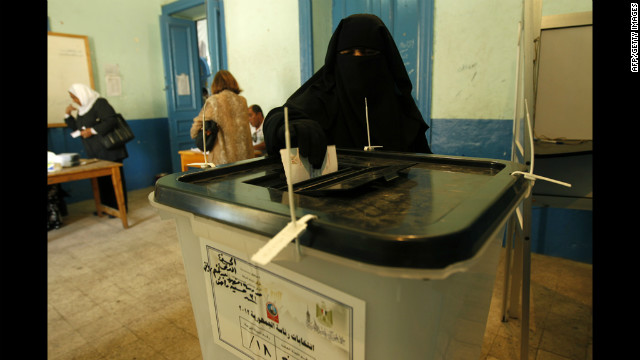 An full veiled Egyptian woman casts her vote at a polling station in Cairo on June 16.
An full veiled Egyptian woman casts her vote at a polling station in Cairo on June 16. 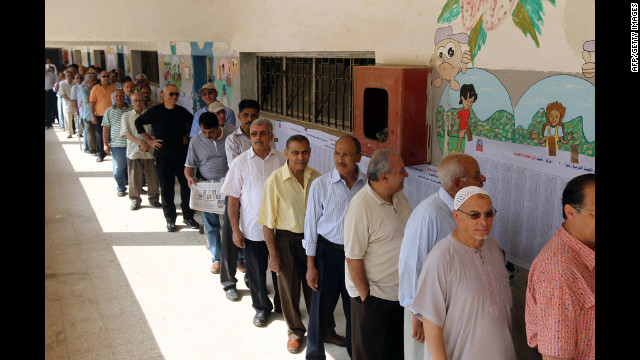 Egyptians queue outside a polling station in Cairo.
Egyptians queue outside a polling station in Cairo. 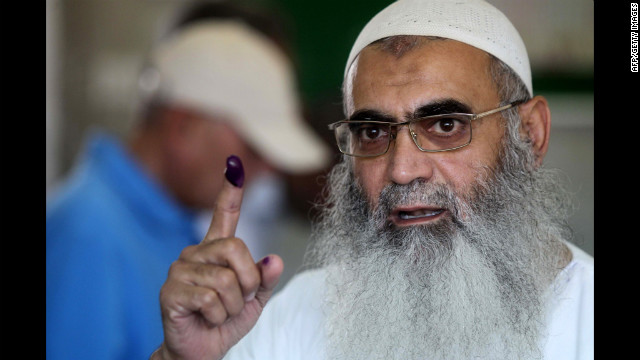 An Egyptian Muslim Salafist shows his ink-stained finger after voting a polling station.
An Egyptian Muslim Salafist shows his ink-stained finger after voting a polling station. 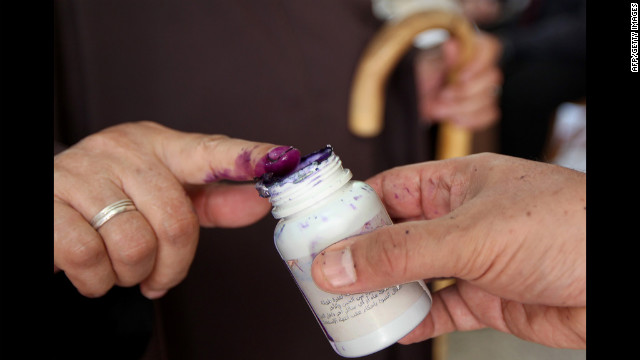 An Egyptian woman dips her finger in indelible ink after casting her ballot.
An Egyptian woman dips her finger in indelible ink after casting her ballot. 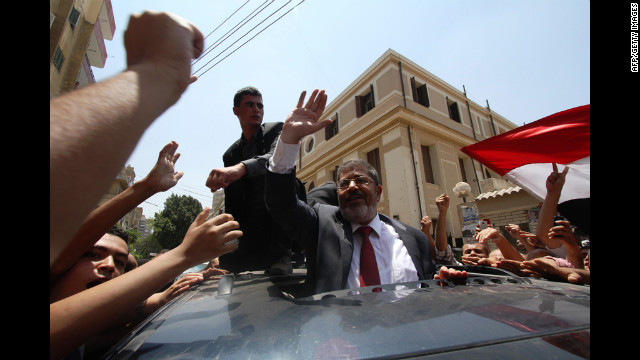 Egyptian Muslim Brotherhood candidate Mohammed Morsi, center, waves to his supporters as he arrives at a polling station to vote in the city of Zagazig.
Egyptian Muslim Brotherhood candidate Mohammed Morsi, center, waves to his supporters as he arrives at a polling station to vote in the city of Zagazig. 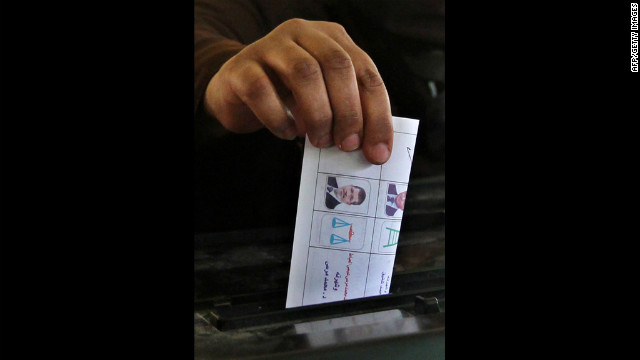 An Egyptian woman casts her ballot in Cairo.
An Egyptian woman casts her ballot in Cairo. 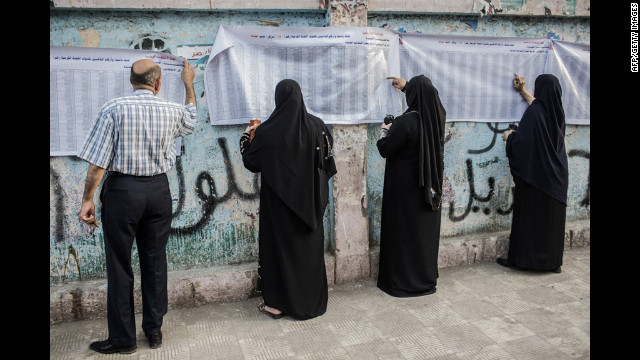 Egyptians check to see their names are listed before casting their vote at a polling station
Egyptians check to see their names are listed before casting their vote at a polling station 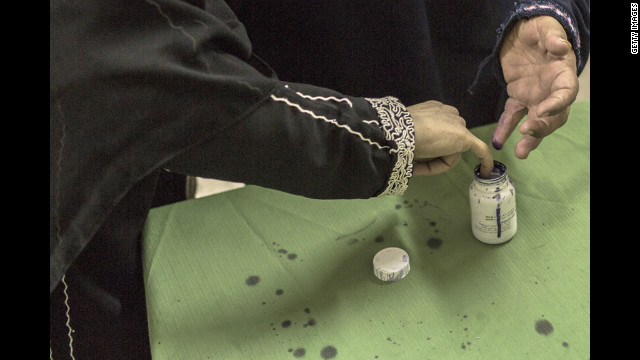 Egyptian women dip their fingers in ink after voting at a polling station.
Egyptian women dip their fingers in ink after voting at a polling station. 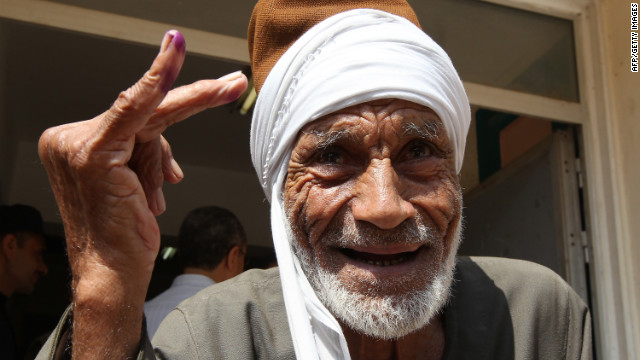 An elderly Egyptian man shows the indelible ink stain on his finger after voting on the first day of the second round of the historical presidential election at a polling station in the city of Zagazig.
An elderly Egyptian man shows the indelible ink stain on his finger after voting on the first day of the second round of the historical presidential election at a polling station in the city of Zagazig. 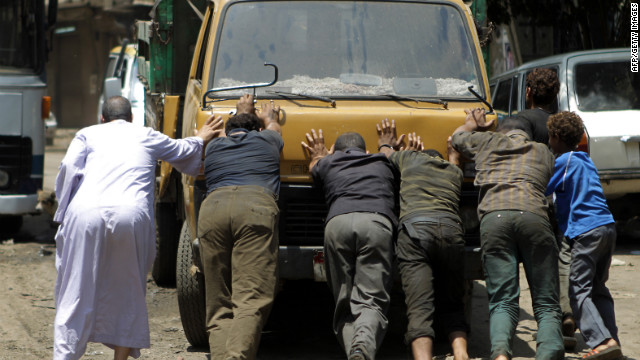 Egyptians push a truck that was blocking the entrance of a polling station.
Egyptians push a truck that was blocking the entrance of a polling station. 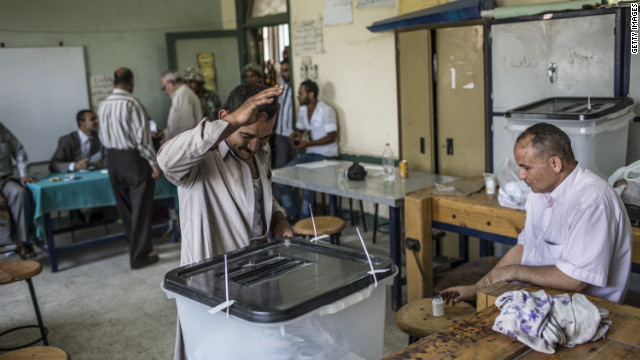 An Egyptian man smiles after casting his vote in Giza.
An Egyptian man smiles after casting his vote in Giza. 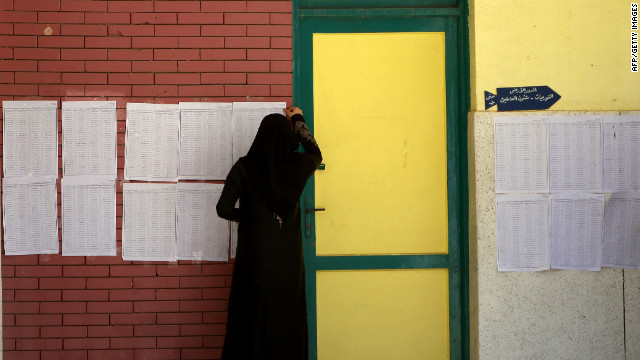 A veiled Egyptian woman looks for her name on the registered voters' list in the city of Zagazig.
A veiled Egyptian woman looks for her name on the registered voters' list in the city of Zagazig. 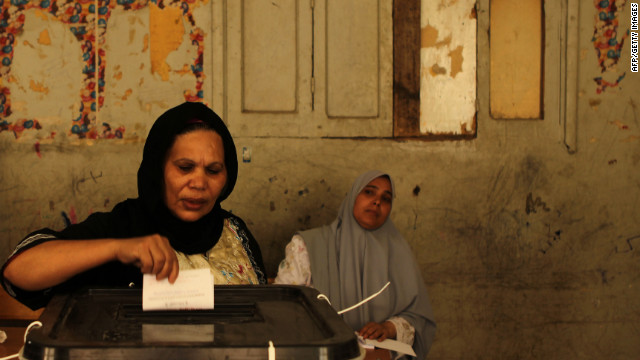 An Egyptian Coptic Christian woman casts her vote in the Cairo Coptic neighborhood of Shubra.
An Egyptian Coptic Christian woman casts her vote in the Cairo Coptic neighborhood of Shubra. 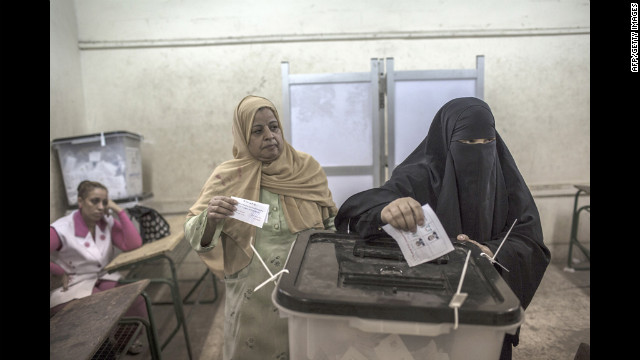 Egyptian women cast their votes at a polling station.
Egyptian women cast their votes at a polling station. 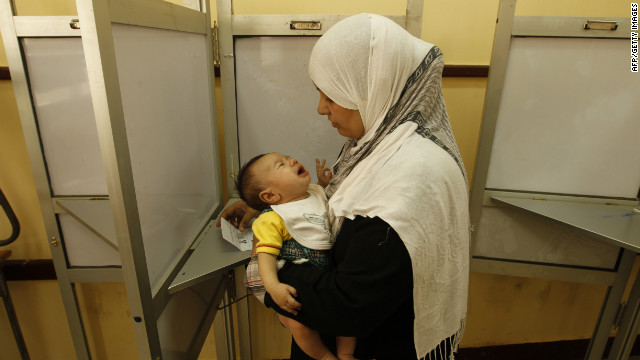 An Egyptian woman holds her baby as she prepares to vote at a polling station in Cairo.
An Egyptian woman holds her baby as she prepares to vote at a polling station in Cairo. 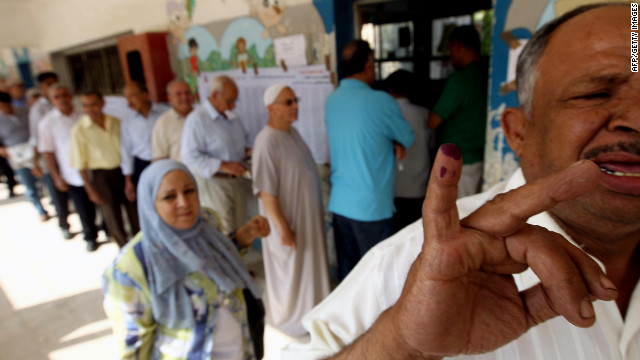 An Egyptian man shows off his little finger covered in indelible ink after casting his vote at a polling station in Cairo.
An Egyptian man shows off his little finger covered in indelible ink after casting his vote at a polling station in Cairo. 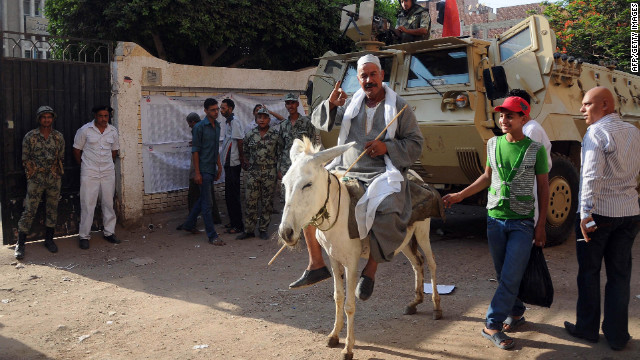 An Egyptian man on his donkey shows his ink-stained finger after casting his ballot.
An Egyptian man on his donkey shows his ink-stained finger after casting his ballot. 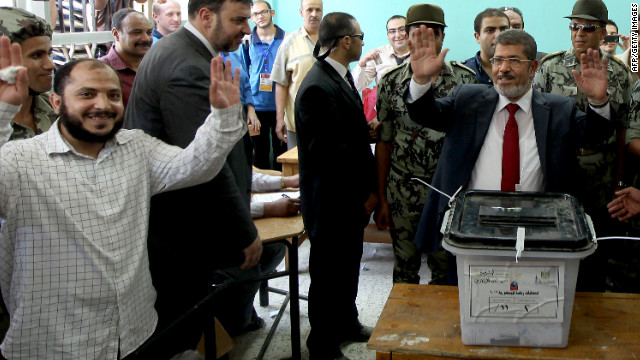 Muslim Brotherhood candidate Mohammed Mursi casts his ballot at a polling station in the city of Zagazig.
Muslim Brotherhood candidate Mohammed Mursi casts his ballot at a polling station in the city of Zagazig. 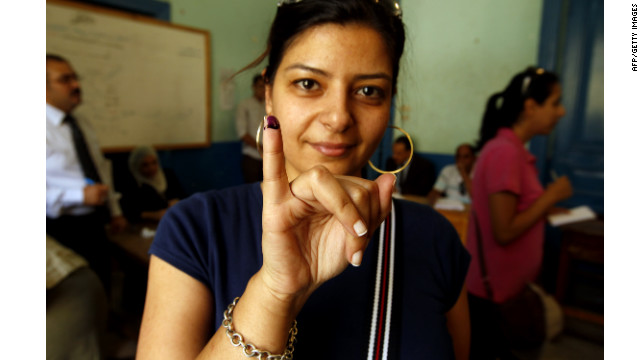 An Egyptian woman holds up an ink-stained finger after casting her vote at a polling station in Cairo.
An Egyptian woman holds up an ink-stained finger after casting her vote at a polling station in Cairo. 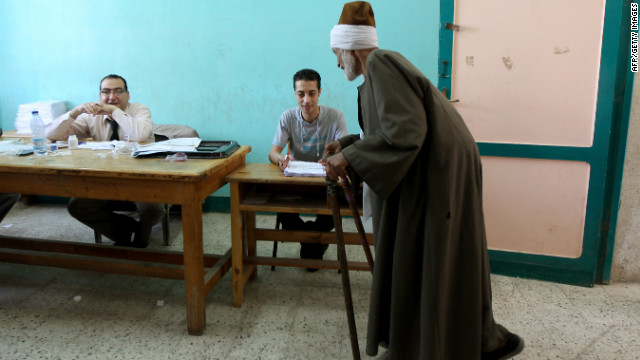 An elderly Egyptian man registers Saturday before voting in the city of Zagazig in an election that pits Ahmed Shafik, the last premier of ousted President Hosni Mubarak, against Muslim Brotherhood candidate Mohammed Morsi.
An elderly Egyptian man registers Saturday before voting in the city of Zagazig in an election that pits Ahmed Shafik, the last premier of ousted President Hosni Mubarak, against Muslim Brotherhood candidate Mohammed Morsi. 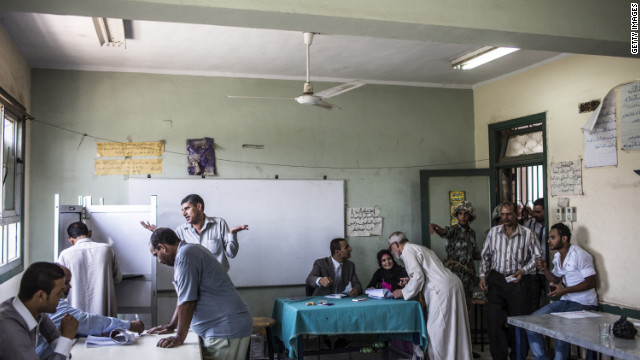 Election officials and an Egyptian soldier direct voters during the second stage of runoff presidential elections at a polling station in Giza.
Election officials and an Egyptian soldier direct voters during the second stage of runoff presidential elections at a polling station in Giza. 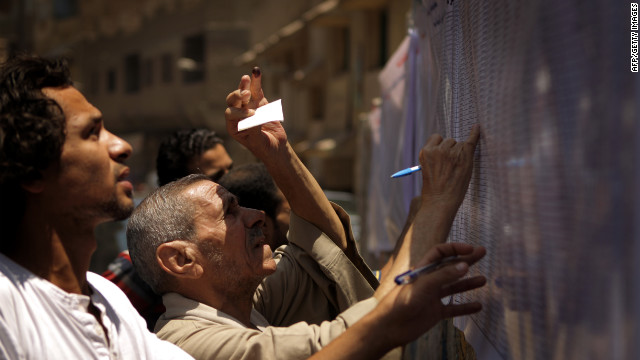 Egyptian Christian Coptic men check the voters' list Saturday outside a polling station in the Cairo Coptic neighborhood of Shubra.
Egyptian Christian Coptic men check the voters' list Saturday outside a polling station in the Cairo Coptic neighborhood of Shubra. 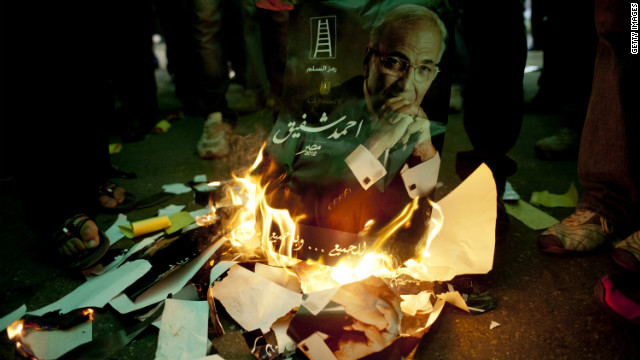 Egyptians burn the likeness of presidential candidate and former Prime Minister Ahmed Shafik in Cairo on Friday, the eve of the nation's presidential election.
Egyptians burn the likeness of presidential candidate and former Prime Minister Ahmed Shafik in Cairo on Friday, the eve of the nation's presidential election. 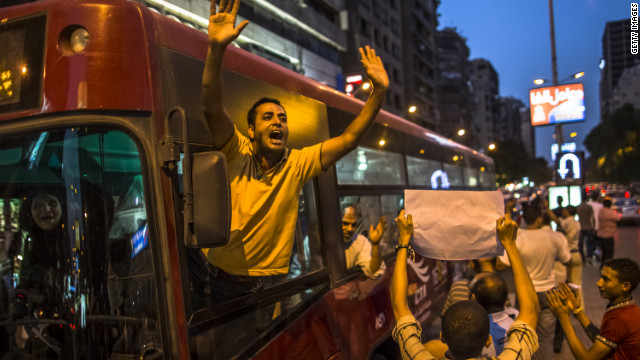 A bus driver stops to wave in support of Egyptian protesters making their way to Tahrir Square on Thursday.
A bus driver stops to wave in support of Egyptian protesters making their way to Tahrir Square on Thursday. 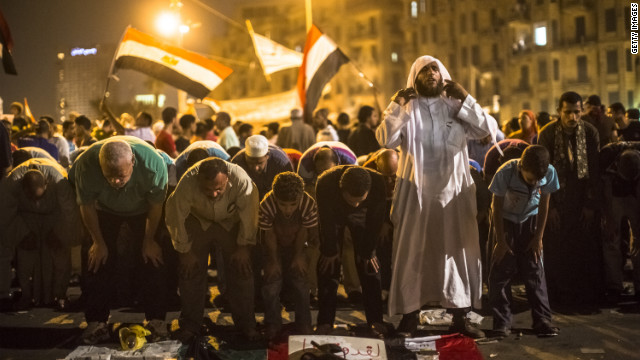 Egyptians pray in Tahrir Square on Thursday during a protest against presidential candidate Ahmed Shafik.
Egyptians pray in Tahrir Square on Thursday during a protest against presidential candidate Ahmed Shafik. 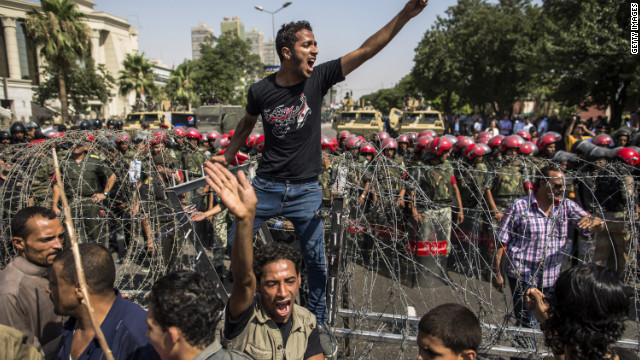 A protester stands on a barricade of barbed wire as Egyptian military police stand guard. Egypt's Supreme Constitutional Court ruled that the Islamist-led parliament must be immediately dissolved.
A protester stands on a barricade of barbed wire as Egyptian military police stand guard. Egypt's Supreme Constitutional Court ruled that the Islamist-led parliament must be immediately dissolved. 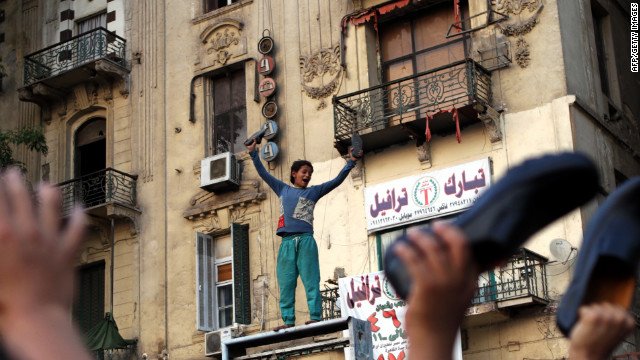 An Egyptian boy waves his shoes as he joins supporters of the Muslim Brotherhood in a protest in Cairo's Tahrir Square against Mubarak-era prime minister and presidential candidate Ahmed Shafik after Egypt's top court rejected on Thursday a law barring him from standing in a tense presidential poll runoff.
An Egyptian boy waves his shoes as he joins supporters of the Muslim Brotherhood in a protest in Cairo's Tahrir Square against Mubarak-era prime minister and presidential candidate Ahmed Shafik after Egypt's top court rejected on Thursday a law barring him from standing in a tense presidential poll runoff. 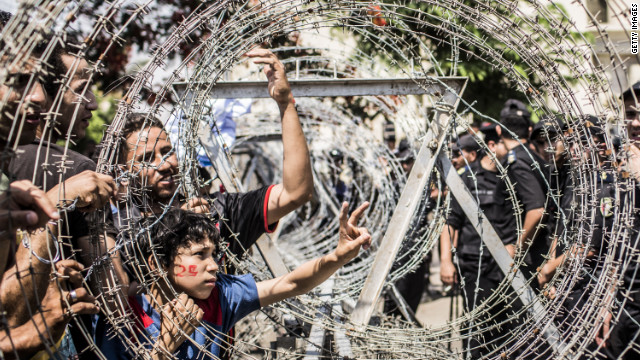 Protestors gesture towards military police through a barricade of barbed wire during a protest against presidential candidate Ahmed Shafik outside the Supreme Constitutional Court on Thursday.
Protestors gesture towards military police through a barricade of barbed wire during a protest against presidential candidate Ahmed Shafik outside the Supreme Constitutional Court on Thursday. 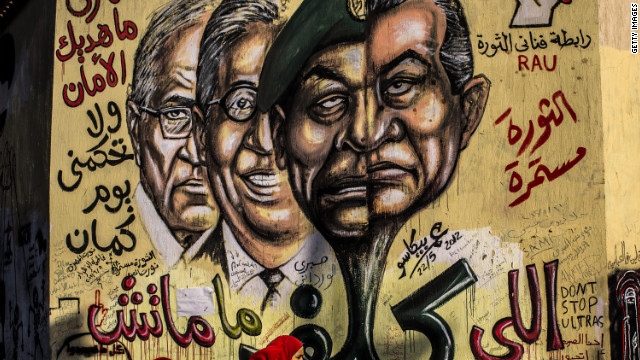 People walk past graffiti showing faces of ousted Egyptian president Hosni Mubarak, right; Field Marshal Hussein Tantawi, second right; former Secretary General of the Arab League Amr Mussa, second left, and former prime minister and presidential candidate Ahmed Shafiq, left, at Tahrir square.
People walk past graffiti showing faces of ousted Egyptian president Hosni Mubarak, right; Field Marshal Hussein Tantawi, second right; former Secretary General of the Arab League Amr Mussa, second left, and former prime minister and presidential candidate Ahmed Shafiq, left, at Tahrir square. 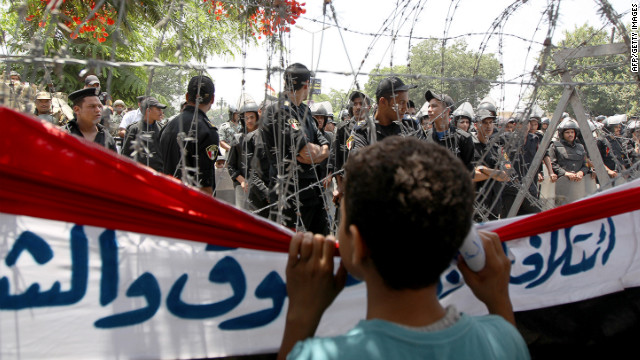 A boy peers through barbed wire at Egyptian military police standing guard outside the Constitutional Court in Cairo on Thursday, June 14.
A boy peers through barbed wire at Egyptian military police standing guard outside the Constitutional Court in Cairo on Thursday, June 14. 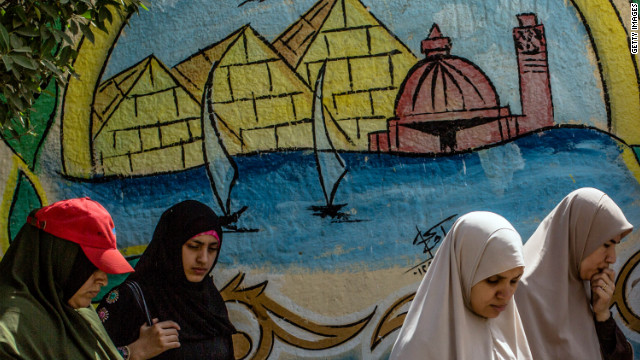 Egyptian women line up to cast their vote Saturday.
Egyptian women line up to cast their vote Saturday. 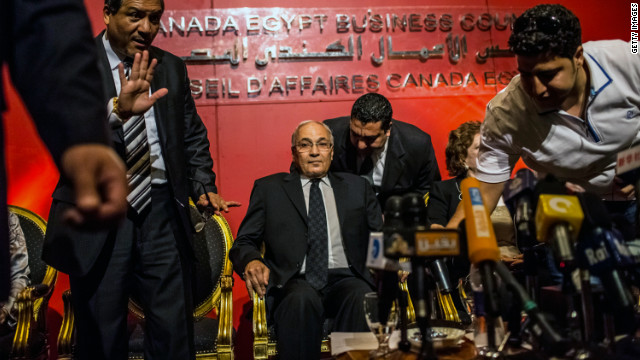 Former Prime Minister Ahmed Shafiq, center, is seated before addressing a business conference in Cairo on Wednesday.
Former Prime Minister Ahmed Shafiq, center, is seated before addressing a business conference in Cairo on Wednesday. 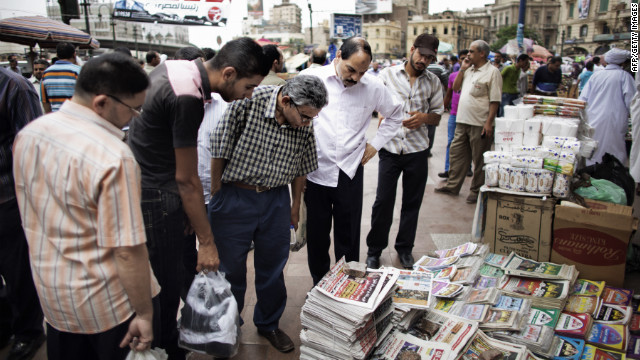 Egyptians read the front page of newspapers for sale outside of Al-Fatah Mosque in Cairo on Friday, May 25.
Egyptians read the front page of newspapers for sale outside of Al-Fatah Mosque in Cairo on Friday, May 25. 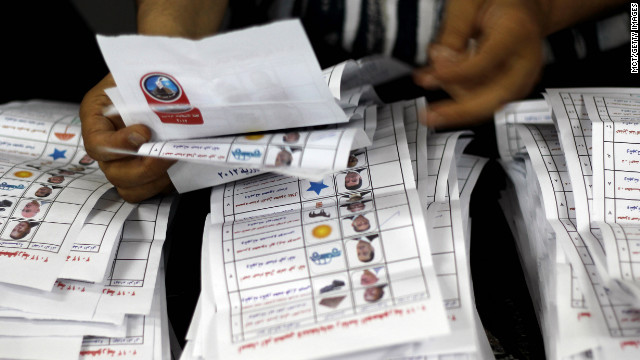 Ballots are counted by election officials in Alexandria as the country eagerly awaits the outcome Friday.
Ballots are counted by election officials in Alexandria as the country eagerly awaits the outcome Friday. 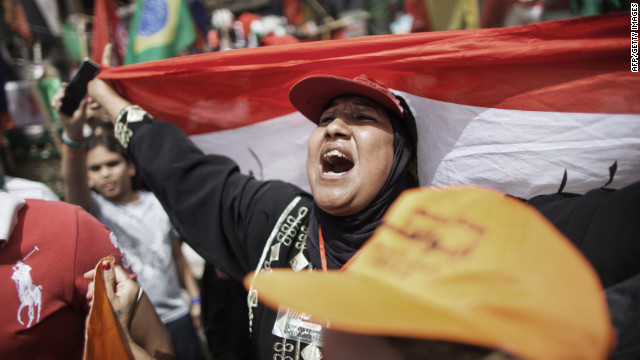 A supporter of presidential candidate Abdelmonen Abol Fotoh voices her opinions at Tahrir Square on Friday.
A supporter of presidential candidate Abdelmonen Abol Fotoh voices her opinions at Tahrir Square on Friday. 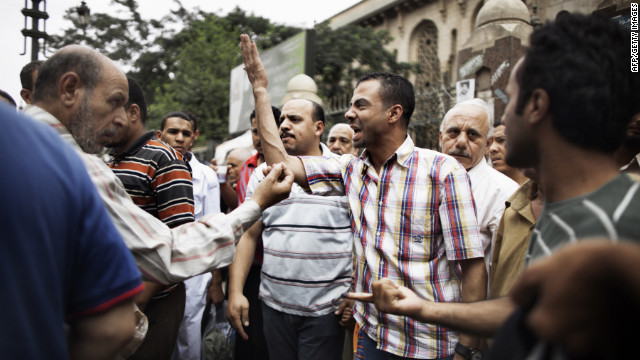 Supporters of various candidates debate outside Al-Fatah Mosque in Cairo on Friday.
Supporters of various candidates debate outside Al-Fatah Mosque in Cairo on Friday. 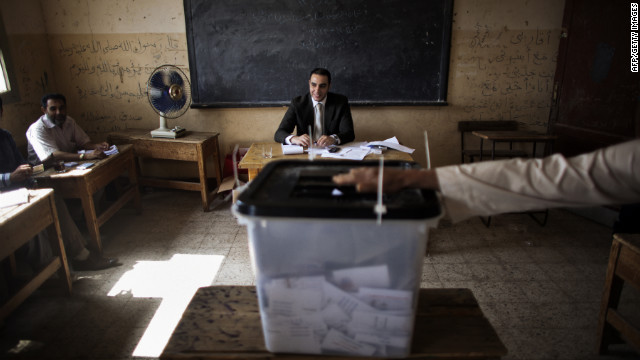 Electoral officials monitor voting in Namul, a village north of Cairo, on Thursday, May 24, the second and final day of voting in Egypt's historic presidential election. Egypt is holding its first presidential election since last year's toppling of Hosni Mubarak, part of the wave of Arab Spring uprisings.
Electoral officials monitor voting in Namul, a village north of Cairo, on Thursday, May 24, the second and final day of voting in Egypt's historic presidential election. Egypt is holding its first presidential election since last year's toppling of Hosni Mubarak, part of the wave of Arab Spring uprisings. 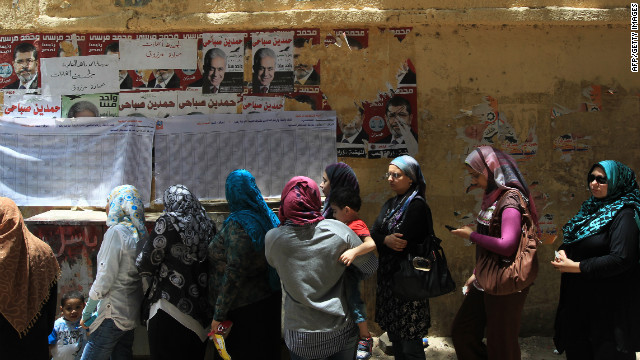 Egyptian women wait in line Thursday to cast their vote outside a polling station in Cairo. If no candidate gets a majority of the vote in the first round of voting, a second round will be held June 16-17.
Egyptian women wait in line Thursday to cast their vote outside a polling station in Cairo. If no candidate gets a majority of the vote in the first round of voting, a second round will be held June 16-17. 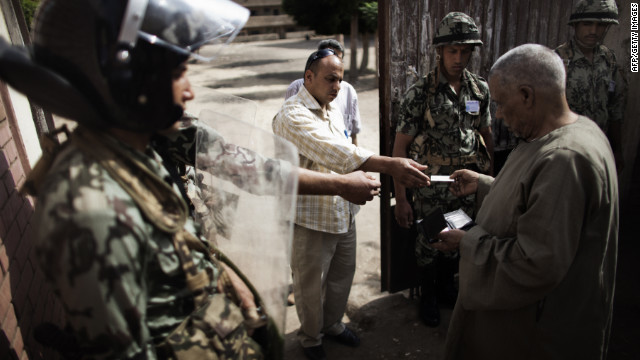 An election worker checks the identification of a voter at a polling place Thursday in Namul as Egyptian soldiers stand guard.
An election worker checks the identification of a voter at a polling place Thursday in Namul as Egyptian soldiers stand guard. 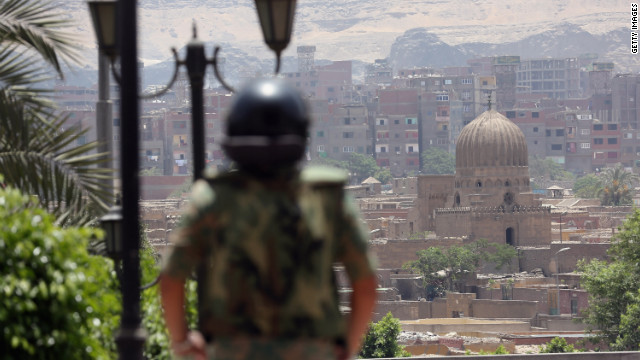 A soldier stands watch in the Egyptian capital on the second day of voting. A pervasive fear exists that the powerful military, which has run the country since Mubarak's fall 16 months ago, could try to hijack the election.
A soldier stands watch in the Egyptian capital on the second day of voting. A pervasive fear exists that the powerful military, which has run the country since Mubarak's fall 16 months ago, could try to hijack the election. 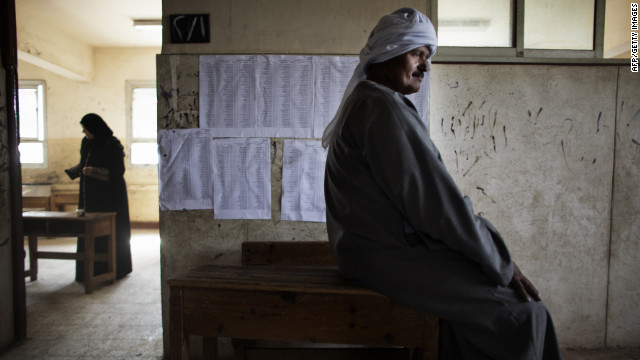 An Egyptian man waits to cast his ballot Thursday north of Cairo. The vote is considered Egypt's first free and fair presidential election in modern history.
An Egyptian man waits to cast his ballot Thursday north of Cairo. The vote is considered Egypt's first free and fair presidential election in modern history. 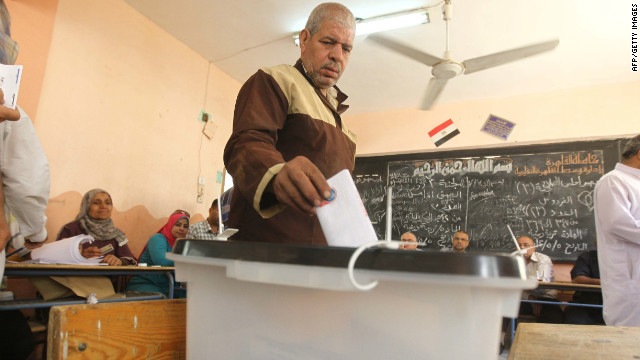 An Egyptian man drops off his ballot at a polling station Thursday in Cairo. The voting marks the first time Egypt has held a presidential election in which the results aren't known beforehand.
An Egyptian man drops off his ballot at a polling station Thursday in Cairo. The voting marks the first time Egypt has held a presidential election in which the results aren't known beforehand. 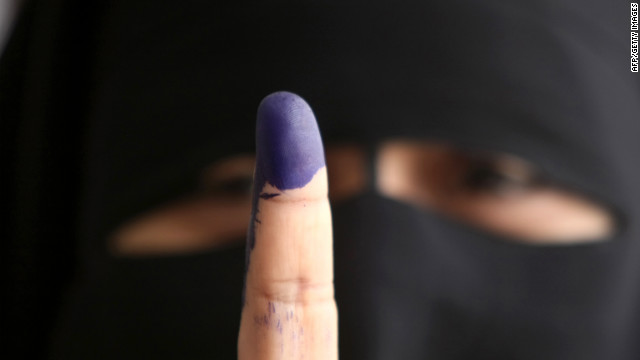 An Egyptian woman holds up an ink-stained finger after casting her ballot in Cairo on Wednesday, May 23, the first day of voting in the historic election.
An Egyptian woman holds up an ink-stained finger after casting her ballot in Cairo on Wednesday, May 23, the first day of voting in the historic election. 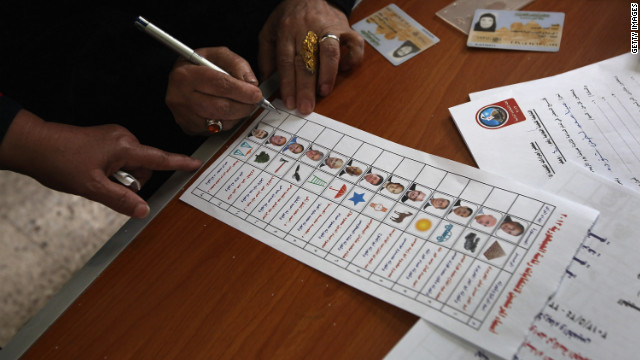 A voter studies her ballot Wednesday in Cairo. Thirteen candidates are competing in the wide-open race, but two withdrew after ballots were printed.
A voter studies her ballot Wednesday in Cairo. Thirteen candidates are competing in the wide-open race, but two withdrew after ballots were printed. 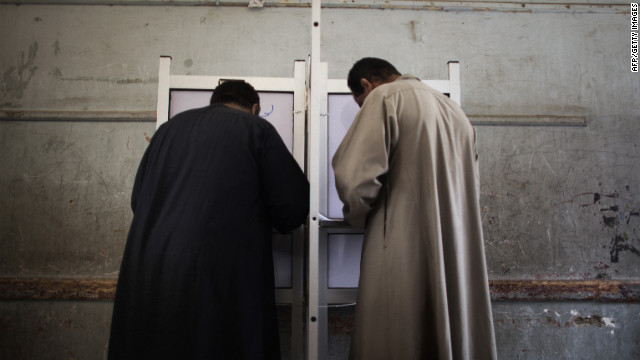 Egyptian men fill out their ballots Wednesday in Cairo. Results of the first round of voting are not expected before the weekend.
Egyptian men fill out their ballots Wednesday in Cairo. Results of the first round of voting are not expected before the weekend. 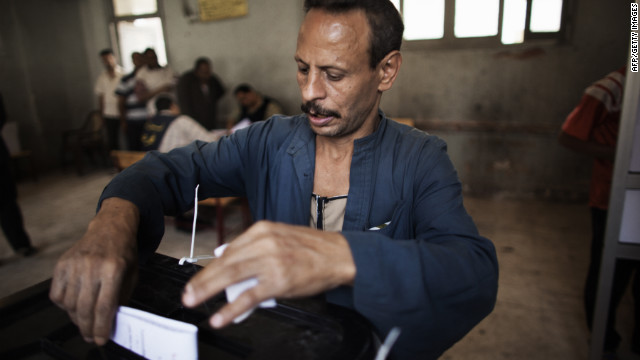 An Egyptian man casts his ballot at a Cairo polling station. Some Egyptians told CNN that they waited up to four hours Wednesday to vote.
An Egyptian man casts his ballot at a Cairo polling station. Some Egyptians told CNN that they waited up to four hours Wednesday to vote. 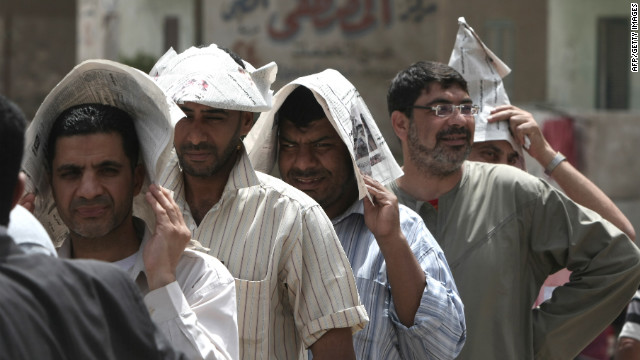 Egyptian men shield themselves from the hot sun outside a Cairo polling station Wednesday.
Egyptian men shield themselves from the hot sun outside a Cairo polling station Wednesday. 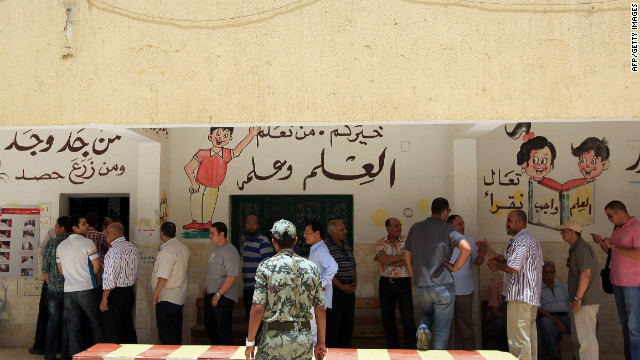 Egyptian men line up to cast their vote Wednesday in Cairo. Some 30,000 volunteers fanned out to ensure voting is fair, said organizers with the April 6 youth movement, which has campaigned for greater democracy in Egypt.
Egyptian men line up to cast their vote Wednesday in Cairo. Some 30,000 volunteers fanned out to ensure voting is fair, said organizers with the April 6 youth movement, which has campaigned for greater democracy in Egypt. 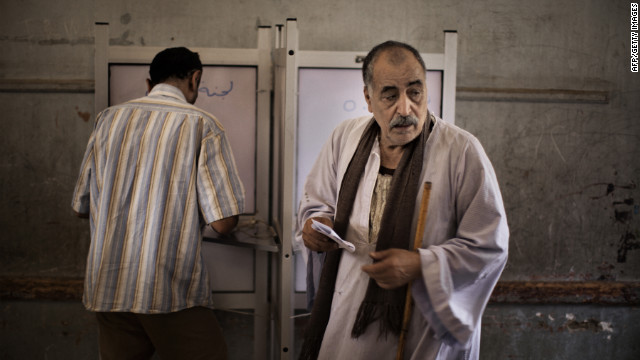 Egyptian men fill out their ballots at a Cairo polling place.
Egyptian men fill out their ballots at a Cairo polling place. 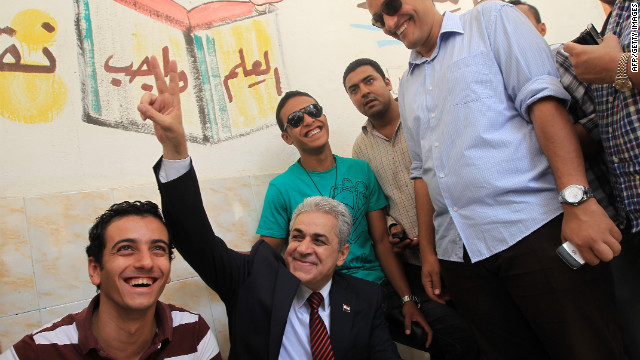 Presidential candidate Hamdeen Sabahy, a leftist dark-horse contender, flashes a sign of victory as he waits to vote at a Cairo school.
Presidential candidate Hamdeen Sabahy, a leftist dark-horse contender, flashes a sign of victory as he waits to vote at a Cairo school. 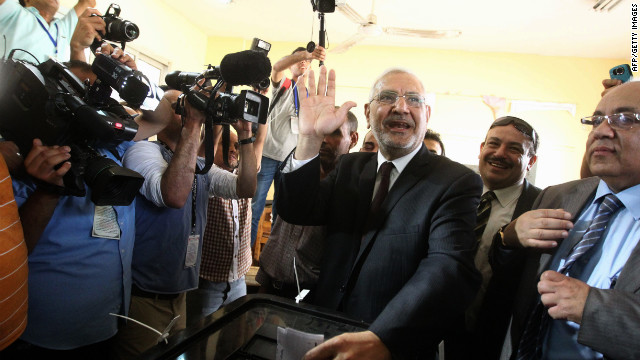 Presidential candidate Abdelmonen Abol Fotoh, a moderate Islamist, casts his ballot Wednesday in Cairo.
Presidential candidate Abdelmonen Abol Fotoh, a moderate Islamist, casts his ballot Wednesday in Cairo. 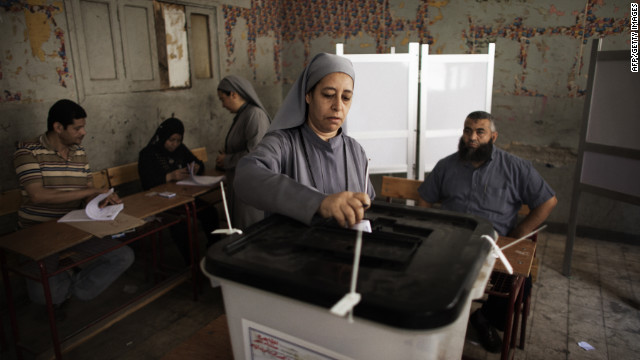 An Egyptian Coptic nun drops her ballot at a Cairo polling station Wednesday.
An Egyptian Coptic nun drops her ballot at a Cairo polling station Wednesday. 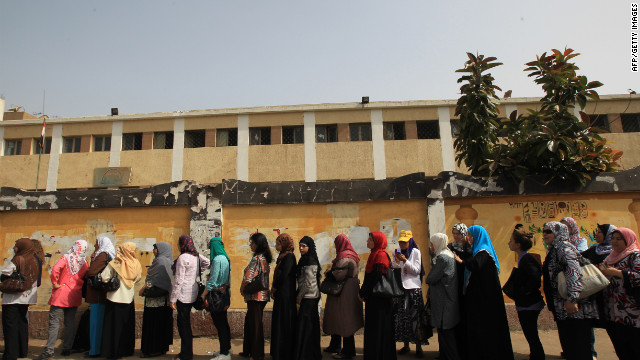 Egyptian women wait outside a polling station in Cairo. Many Egyptians seem uncertain of their loyalties to any particular candidate.
Egyptian women wait outside a polling station in Cairo. Many Egyptians seem uncertain of their loyalties to any particular candidate. What many observers are calling a
"constitutional coup" has serious implications not only for the prospect of democracy in Egypt, but also for the future of the Arab world and for the close relationship between Washington and Cairo.
The drama began Thursday, when the Court
ruled to expel one-third of the parliament entrusted with drafting a new constitution. The court held that the entire parliament, in which the Muslim Brotherhood and allies have a majority, had to be disbanded.
The court's ruling was "absurd, destructive and essentially voids Egypt's last year of politics of meaning,"
Marc Lynch wrote in
Foreign Policy. The director of the
Institute for Middle East Studies said the country was going through the "stupidest transition in history."
"With Egypt looking ahead to no parliament, no constitution and a deeply divisive new president, it's fair to say the experiment in military-led transition has come to its disappointing end," Lynch wrote.
While Egypt dealt with upheaval, its justice ministry (part of the government appointed by the ruling military council) extended the powers of military police and intelligence agents, allowing them to arrest civilians for a wide range of offenses, including protesting.
Late Sunday, Egyptians had still gone ahead and voted in the presidential election.
The United States Embassy in Cairo tweeted Monday: "We congratulate Egypt on this presidential race. It's a historic event 4 democracy in Egypt."
Hours later, the view from the U.S. State Department seemed different.
"We are particularly concerned by decisions that appear to prolong the military's hold on power," said spokeswoman Victoria Nuland.
Meanwhile, the Supreme Council announced that an appointed assembly would draft the constitution, replacing the assembly chosen by the elected parliament. The Supreme Council also announced it would "decide all matters related to military affairs," including the country's defense budget. There would be no civilian oversight, they said.
Egyptians already appeared to be losing faith in politics, with a low turnout in voting between the Muslim Brotherhood's candidate, Mohammed al-Morsi, and Ahmed Shafik, who was Mubarak's last prime minister.
Now, whoever wins could discover the office of the president has much lesser authority than it did before.
Nobel Laureate
Mohamed ElBaradei, himself once a presidential contender, tweeted: "Electing president in the absence of constitution and parliament is electing an 'emperor' with more powers than deposed dictator. A travesty."
ElBaradei was once considered a sell-out by disappointed leaderless revolutionaries for not participating in this year's presidential race.



 Egyptian supporters of the Muslim Brotherhood's Mohamed Morsi rally in Cairo's Tahrir Square on Monday, June 18. Morsi declared victory as Egypt's first democratically elected president even as military rulers issued a decree that virtually stripped the position of power.
Egyptian supporters of the Muslim Brotherhood's Mohamed Morsi rally in Cairo's Tahrir Square on Monday, June 18. Morsi declared victory as Egypt's first democratically elected president even as military rulers issued a decree that virtually stripped the position of power. Morsi supporters wave flags Monday in Cairo's Tahrir Square after the Islamists claimed victory. The square was considered the heart of the February 2011 uprising that led to Hosni Mubarak's downfall.
Morsi supporters wave flags Monday in Cairo's Tahrir Square after the Islamists claimed victory. The square was considered the heart of the February 2011 uprising that led to Hosni Mubarak's downfall.  The Muslim Brotherhood's Mohamed Morsi makes his way through supporters at electoral headquarters early Monday in Cairo. In a victory speech, Morsi did not address the military council's move but tried to allay fears he would impose an Islamist state.
The Muslim Brotherhood's Mohamed Morsi makes his way through supporters at electoral headquarters early Monday in Cairo. In a victory speech, Morsi did not address the military council's move but tried to allay fears he would impose an Islamist state.  Morsi supporters celebrate Monday in Cairo. Votes in the Egyptian capital, the largest population center, continued to be tallied, but unofficial results by a state-run news website showed Morsi leading elsewhere with 11.2 million votes, compared with 10.3 million for Ahmed Shafik, the last prime minister in the waning days of Mubarak's regime.
Morsi supporters celebrate Monday in Cairo. Votes in the Egyptian capital, the largest population center, continued to be tallied, but unofficial results by a state-run news website showed Morsi leading elsewhere with 11.2 million votes, compared with 10.3 million for Ahmed Shafik, the last prime minister in the waning days of Mubarak's regime.  Egyptian election officials count ballots at a polling station in Cairo on Sunday, June 17. The official vote count was scheduled to be finished Monday.
Egyptian election officials count ballots at a polling station in Cairo on Sunday, June 17. The official vote count was scheduled to be finished Monday.  The Muslim Brotherhood on Sunday claims its candidate, Mohamed Morsi, has defeated foe Ahmed Shafik to become Egypt's president.
The Muslim Brotherhood on Sunday claims its candidate, Mohamed Morsi, has defeated foe Ahmed Shafik to become Egypt's president.  An Egyptian woman shows her ink-stained finger, marking that she voted in Cairo on Sunday.
An Egyptian woman shows her ink-stained finger, marking that she voted in Cairo on Sunday.  Women line up to vote at a polling station in Cairo, Egypt, on the second and final day of the run-off presidential election.
Women line up to vote at a polling station in Cairo, Egypt, on the second and final day of the run-off presidential election.  Women line-up to cast their vote at a polling station in Cairo on Sunday.
Women line-up to cast their vote at a polling station in Cairo on Sunday.  Egyptian Christian Coptic men help a woman reach a polling station in the Cairo Coptic Shubra neighborhood on Saturday, June 16. Voters returned to the polls after Egypt's Supreme Constitutional Court ruled Thursday that the Islamist-led Parliament must be immediately dissolved.
Egyptian Christian Coptic men help a woman reach a polling station in the Cairo Coptic Shubra neighborhood on Saturday, June 16. Voters returned to the polls after Egypt's Supreme Constitutional Court ruled Thursday that the Islamist-led Parliament must be immediately dissolved.  An full veiled Egyptian woman casts her vote at a polling station in Cairo on June 16.
An full veiled Egyptian woman casts her vote at a polling station in Cairo on June 16.  Egyptians queue outside a polling station in Cairo.
Egyptians queue outside a polling station in Cairo.  An Egyptian Muslim Salafist shows his ink-stained finger after voting a polling station.
An Egyptian Muslim Salafist shows his ink-stained finger after voting a polling station.  An Egyptian woman dips her finger in indelible ink after casting her ballot.
An Egyptian woman dips her finger in indelible ink after casting her ballot.  Egyptian Muslim Brotherhood candidate Mohammed Morsi, center, waves to his supporters as he arrives at a polling station to vote in the city of Zagazig.
Egyptian Muslim Brotherhood candidate Mohammed Morsi, center, waves to his supporters as he arrives at a polling station to vote in the city of Zagazig.  An Egyptian woman casts her ballot in Cairo.
An Egyptian woman casts her ballot in Cairo.  Egyptians check to see their names are listed before casting their vote at a polling station
Egyptians check to see their names are listed before casting their vote at a polling station  Egyptian women dip their fingers in ink after voting at a polling station.
Egyptian women dip their fingers in ink after voting at a polling station.  An elderly Egyptian man shows the indelible ink stain on his finger after voting on the first day of the second round of the historical presidential election at a polling station in the city of Zagazig.
An elderly Egyptian man shows the indelible ink stain on his finger after voting on the first day of the second round of the historical presidential election at a polling station in the city of Zagazig.  Egyptians push a truck that was blocking the entrance of a polling station.
Egyptians push a truck that was blocking the entrance of a polling station.  An Egyptian man smiles after casting his vote in Giza.
An Egyptian man smiles after casting his vote in Giza.  A veiled Egyptian woman looks for her name on the registered voters' list in the city of Zagazig.
A veiled Egyptian woman looks for her name on the registered voters' list in the city of Zagazig.  An Egyptian Coptic Christian woman casts her vote in the Cairo Coptic neighborhood of Shubra.
An Egyptian Coptic Christian woman casts her vote in the Cairo Coptic neighborhood of Shubra.  Egyptian women cast their votes at a polling station.
Egyptian women cast their votes at a polling station.  An Egyptian woman holds her baby as she prepares to vote at a polling station in Cairo.
An Egyptian woman holds her baby as she prepares to vote at a polling station in Cairo.  An Egyptian man shows off his little finger covered in indelible ink after casting his vote at a polling station in Cairo.
An Egyptian man shows off his little finger covered in indelible ink after casting his vote at a polling station in Cairo.  An Egyptian man on his donkey shows his ink-stained finger after casting his ballot.
An Egyptian man on his donkey shows his ink-stained finger after casting his ballot.  Muslim Brotherhood candidate Mohammed Mursi casts his ballot at a polling station in the city of Zagazig.
Muslim Brotherhood candidate Mohammed Mursi casts his ballot at a polling station in the city of Zagazig.  An Egyptian woman holds up an ink-stained finger after casting her vote at a polling station in Cairo.
An Egyptian woman holds up an ink-stained finger after casting her vote at a polling station in Cairo.  An elderly Egyptian man registers Saturday before voting in the city of Zagazig in an election that pits Ahmed Shafik, the last premier of ousted President Hosni Mubarak, against Muslim Brotherhood candidate Mohammed Morsi.
An elderly Egyptian man registers Saturday before voting in the city of Zagazig in an election that pits Ahmed Shafik, the last premier of ousted President Hosni Mubarak, against Muslim Brotherhood candidate Mohammed Morsi.  Election officials and an Egyptian soldier direct voters during the second stage of runoff presidential elections at a polling station in Giza.
Election officials and an Egyptian soldier direct voters during the second stage of runoff presidential elections at a polling station in Giza.  Egyptian Christian Coptic men check the voters' list Saturday outside a polling station in the Cairo Coptic neighborhood of Shubra.
Egyptian Christian Coptic men check the voters' list Saturday outside a polling station in the Cairo Coptic neighborhood of Shubra.  Egyptians burn the likeness of presidential candidate and former Prime Minister Ahmed Shafik in Cairo on Friday, the eve of the nation's presidential election.
Egyptians burn the likeness of presidential candidate and former Prime Minister Ahmed Shafik in Cairo on Friday, the eve of the nation's presidential election.  A bus driver stops to wave in support of Egyptian protesters making their way to Tahrir Square on Thursday.
A bus driver stops to wave in support of Egyptian protesters making their way to Tahrir Square on Thursday.  Egyptians pray in Tahrir Square on Thursday during a protest against presidential candidate Ahmed Shafik.
Egyptians pray in Tahrir Square on Thursday during a protest against presidential candidate Ahmed Shafik.  A protester stands on a barricade of barbed wire as Egyptian military police stand guard. Egypt's Supreme Constitutional Court ruled that the Islamist-led parliament must be immediately dissolved.
A protester stands on a barricade of barbed wire as Egyptian military police stand guard. Egypt's Supreme Constitutional Court ruled that the Islamist-led parliament must be immediately dissolved.  An Egyptian boy waves his shoes as he joins supporters of the Muslim Brotherhood in a protest in Cairo's Tahrir Square against Mubarak-era prime minister and presidential candidate Ahmed Shafik after Egypt's top court rejected on Thursday a law barring him from standing in a tense presidential poll runoff.
An Egyptian boy waves his shoes as he joins supporters of the Muslim Brotherhood in a protest in Cairo's Tahrir Square against Mubarak-era prime minister and presidential candidate Ahmed Shafik after Egypt's top court rejected on Thursday a law barring him from standing in a tense presidential poll runoff.  Protestors gesture towards military police through a barricade of barbed wire during a protest against presidential candidate Ahmed Shafik outside the Supreme Constitutional Court on Thursday.
Protestors gesture towards military police through a barricade of barbed wire during a protest against presidential candidate Ahmed Shafik outside the Supreme Constitutional Court on Thursday.  People walk past graffiti showing faces of ousted Egyptian president Hosni Mubarak, right; Field Marshal Hussein Tantawi, second right; former Secretary General of the Arab League Amr Mussa, second left, and former prime minister and presidential candidate Ahmed Shafiq, left, at Tahrir square.
People walk past graffiti showing faces of ousted Egyptian president Hosni Mubarak, right; Field Marshal Hussein Tantawi, second right; former Secretary General of the Arab League Amr Mussa, second left, and former prime minister and presidential candidate Ahmed Shafiq, left, at Tahrir square.  A boy peers through barbed wire at Egyptian military police standing guard outside the Constitutional Court in Cairo on Thursday, June 14.
A boy peers through barbed wire at Egyptian military police standing guard outside the Constitutional Court in Cairo on Thursday, June 14.  Egyptian women line up to cast their vote Saturday.
Egyptian women line up to cast their vote Saturday.  Former Prime Minister Ahmed Shafiq, center, is seated before addressing a business conference in Cairo on Wednesday.
Former Prime Minister Ahmed Shafiq, center, is seated before addressing a business conference in Cairo on Wednesday.  Egyptians read the front page of newspapers for sale outside of Al-Fatah Mosque in Cairo on Friday, May 25.
Egyptians read the front page of newspapers for sale outside of Al-Fatah Mosque in Cairo on Friday, May 25.  Ballots are counted by election officials in Alexandria as the country eagerly awaits the outcome Friday.
Ballots are counted by election officials in Alexandria as the country eagerly awaits the outcome Friday.  A supporter of presidential candidate Abdelmonen Abol Fotoh voices her opinions at Tahrir Square on Friday.
A supporter of presidential candidate Abdelmonen Abol Fotoh voices her opinions at Tahrir Square on Friday.  Supporters of various candidates debate outside Al-Fatah Mosque in Cairo on Friday.
Supporters of various candidates debate outside Al-Fatah Mosque in Cairo on Friday.  Electoral officials monitor voting in Namul, a village north of Cairo, on Thursday, May 24, the second and final day of voting in Egypt's historic presidential election. Egypt is holding its first presidential election since last year's toppling of Hosni Mubarak, part of the wave of Arab Spring uprisings.
Electoral officials monitor voting in Namul, a village north of Cairo, on Thursday, May 24, the second and final day of voting in Egypt's historic presidential election. Egypt is holding its first presidential election since last year's toppling of Hosni Mubarak, part of the wave of Arab Spring uprisings.  Egyptian women wait in line Thursday to cast their vote outside a polling station in Cairo. If no candidate gets a majority of the vote in the first round of voting, a second round will be held June 16-17.
Egyptian women wait in line Thursday to cast their vote outside a polling station in Cairo. If no candidate gets a majority of the vote in the first round of voting, a second round will be held June 16-17.  An election worker checks the identification of a voter at a polling place Thursday in Namul as Egyptian soldiers stand guard.
An election worker checks the identification of a voter at a polling place Thursday in Namul as Egyptian soldiers stand guard.  A soldier stands watch in the Egyptian capital on the second day of voting. A pervasive fear exists that the powerful military, which has run the country since Mubarak's fall 16 months ago, could try to hijack the election.
A soldier stands watch in the Egyptian capital on the second day of voting. A pervasive fear exists that the powerful military, which has run the country since Mubarak's fall 16 months ago, could try to hijack the election.  An Egyptian man waits to cast his ballot Thursday north of Cairo. The vote is considered Egypt's first free and fair presidential election in modern history.
An Egyptian man waits to cast his ballot Thursday north of Cairo. The vote is considered Egypt's first free and fair presidential election in modern history.  An Egyptian man drops off his ballot at a polling station Thursday in Cairo. The voting marks the first time Egypt has held a presidential election in which the results aren't known beforehand.
An Egyptian man drops off his ballot at a polling station Thursday in Cairo. The voting marks the first time Egypt has held a presidential election in which the results aren't known beforehand.  An Egyptian woman holds up an ink-stained finger after casting her ballot in Cairo on Wednesday, May 23, the first day of voting in the historic election.
An Egyptian woman holds up an ink-stained finger after casting her ballot in Cairo on Wednesday, May 23, the first day of voting in the historic election.  A voter studies her ballot Wednesday in Cairo. Thirteen candidates are competing in the wide-open race, but two withdrew after ballots were printed.
A voter studies her ballot Wednesday in Cairo. Thirteen candidates are competing in the wide-open race, but two withdrew after ballots were printed.  Egyptian men fill out their ballots Wednesday in Cairo. Results of the first round of voting are not expected before the weekend.
Egyptian men fill out their ballots Wednesday in Cairo. Results of the first round of voting are not expected before the weekend.  An Egyptian man casts his ballot at a Cairo polling station. Some Egyptians told CNN that they waited up to four hours Wednesday to vote.
An Egyptian man casts his ballot at a Cairo polling station. Some Egyptians told CNN that they waited up to four hours Wednesday to vote.  Egyptian men shield themselves from the hot sun outside a Cairo polling station Wednesday.
Egyptian men shield themselves from the hot sun outside a Cairo polling station Wednesday.  Egyptian men line up to cast their vote Wednesday in Cairo. Some 30,000 volunteers fanned out to ensure voting is fair, said organizers with the April 6 youth movement, which has campaigned for greater democracy in Egypt.
Egyptian men line up to cast their vote Wednesday in Cairo. Some 30,000 volunteers fanned out to ensure voting is fair, said organizers with the April 6 youth movement, which has campaigned for greater democracy in Egypt.  Egyptian men fill out their ballots at a Cairo polling place.
Egyptian men fill out their ballots at a Cairo polling place.  Presidential candidate Hamdeen Sabahy, a leftist dark-horse contender, flashes a sign of victory as he waits to vote at a Cairo school.
Presidential candidate Hamdeen Sabahy, a leftist dark-horse contender, flashes a sign of victory as he waits to vote at a Cairo school.  Presidential candidate Abdelmonen Abol Fotoh, a moderate Islamist, casts his ballot Wednesday in Cairo.
Presidential candidate Abdelmonen Abol Fotoh, a moderate Islamist, casts his ballot Wednesday in Cairo.  An Egyptian Coptic nun drops her ballot at a Cairo polling station Wednesday.
An Egyptian Coptic nun drops her ballot at a Cairo polling station Wednesday.  Egyptian women wait outside a polling station in Cairo. Many Egyptians seem uncertain of their loyalties to any particular candidate.
Egyptian women wait outside a polling station in Cairo. Many Egyptians seem uncertain of their loyalties to any particular candidate. 





























































